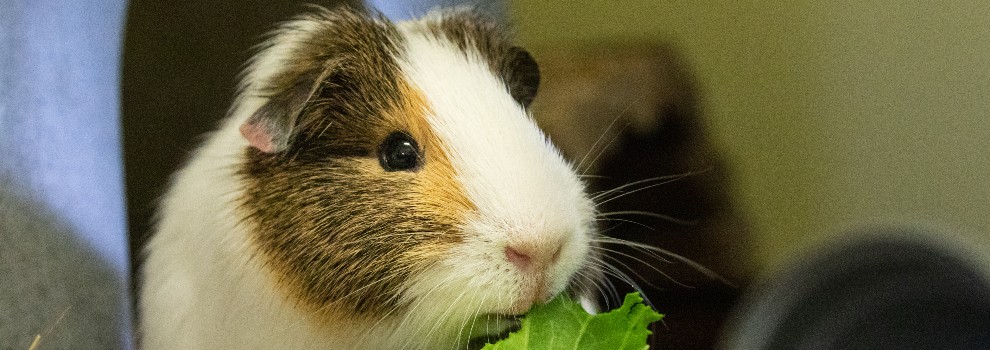Beginners guide to Guinea Pig care
Guinea pigs are active most of the day (up to 20 hours!)
Guinea pigs are very active, they can be awake for up to 20 hours a day. This means that they need lots of space to move around. This space can be outdoors, indoors, or a combination of both. Their space should have a sleeping space, as well exercise space so that your guinea pigs can explore, run around, and play. Remember it can get both really hot and really cold in Arizona, so if it is too hot or cold they will need to stay cozy indoors.
Guinea pigs are hiders, not climbers
While guinea pigs are active, they're not particularly agile. Guinea pigs enjoy ground items, like tunnels and hideaways rather than ladders or climbing objects. We typically recommend a hazard-free environment, as this would reduce the risk of injury. If your guinea pig injures themselves, call your local veterinarian.
They require a balanced diet
Guinea pigs require constant access to grass and/or good quality hay. They don't produce vitamin C and because of this they also need a fresh portion of grass-based guinea pig pellets and safe, washed leafy greens daily. Feeding the correct diet will help keep your guinea's digestive system working nicely and keep their teeth the correct length and shape.
Safe vegetables include: carrots + carrot tops, kale, broccoli, parsley, and collard greens. Fruits should be avoided as this can cause oral sores to develop, but a single orange slice can be given for vitamin C.
-
Guinea pigs are very social
In the wild guinea pigs live in groups of between five and ten, so keeping guinea pigs in pairs or small groups is ideal. Good combinations include single-sex pairs or a combination of neutered male with one or more females. The right pairings will help keep your guinea pigs happy as they are social pets.
Making friends with your guinea pig is also important. Careful, considerate handling by an adult from an early age will help guinea pigs be calm and relaxed in human company.

- Cage requirements
Guinea pig housing should be relatively simple, and should not be housed in anything smaller than 7.5 ft squared and can be wire, plastic, or metal. We recommend flooring be solid, so place a solid substrate on the bottom that can be easily sanitized and/cleaned. Good ventilation is important as they can urinate/defecate in the cage. The cage walls should be at least 10 inches tall, and the top can be open as guinea pigs do not jump or climb.
A sipper water bottle is recommended, to prevent spilling and soiling bedding. If water spills and the pet sits, it can cause various health concerns for the pet.
The cage should not be placed in direct sunlight. Guinea pigs tolerate cooler temperatures better than warmer. Recommended temperature of the cage: 65-79 degrees.
For bedding, shredded newspaper, or recycled paper litter is recommended. The bedding should be changed every 2-3 days as recommended to prevent high levels of ammonia from urination, and large quantities of feces (may contaminate food and water).
- They make 11 individual sounds
The infamous 'wheek-wheek' is one of 11 sounds that guinea pigs make. This 'wheek-wheek' noise is usually a sign of excitement but your guineas will make all sorts of noises for different reasons. Chutting, a purring type of sound means a guinea pig is relaxed, while squeaks often indicate an alarmed or scared guinea pig. Guinea pigs also coo to soothe and comfort each other and will chatter and show their teeth to each other if they are angry or want some space.
- Keep them entertained!
Guinea pigs are very intelligent. If you're planning on adopting, it's important to think about the amount of mental stimulation they'll need. Whether your guinea pigs are inside or outside, a combination of space, toys and things for them to explore will keep them from getting bored.
They will generally enjoy toys that they can gnaw, forage, or hide in. Interesting food (wrapped or hidden in guinea pig safe ways) is also a winner. Wicker or straw objects, tunnels and houses can also be very popular with guinea pigs.
Expert tip: Some toys can be unsuitable for guinea pigs, including plastic toys that can be chewed and swallowed.
Fun Fact!
Did you know? Because of the shape of their head, they can also see above and behind themselves! They use these senses to find places to hide, and nooks and crannies to find refuge. To help your guinea pigs feel safe, secure and happy, their home should include small covers and tunnels in their enclosure. This'll mean that your guinea pigs have somewhere to explore and hide.
